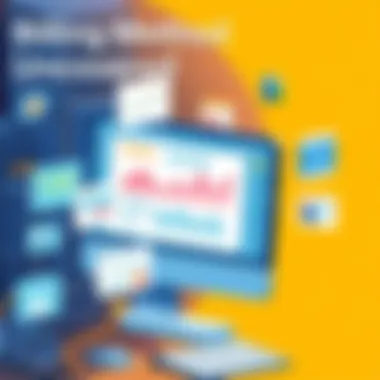Avalon Client Services Billing: Comprehensive Guide


Intro
Navigating the world of billing can feel like wandering through a dense forest without a map, especially for organizations dealing with multiple clients and service providers. When it comes to Avalon Client Services, understanding the billing process is crucial for anyone involved—whether you're a client, an IT professional, or an entrepreneur trying to optimize financial engagements. This article will peel back the layers surrounding Avalon Client Services billing, revealing methodologies, technologies, and best practices that shape the financial landscape.
Understanding these components means more than just checking boxes; it’s about building stronger relationships with stakeholders and enhancing communication efficacy. As we embark on this exploration, gear up to dive into the trends shaping the industry, the software tools that facilitate seamless billing, and challenges that clients face. By the end, you’ll have a comprehensive grip on how to maneuver through Avalon Client Services' billing processes and chart a path towards financial efficiency and clarity.
Prelude to Avalon Client Services Billing
When it comes to managing client relationships and financial operations, Avalon Client Services has carved a niche for itself, particularly in its billing processes. Understanding Avalon Client Services Billing is not just a matter of following steps or procedures; it’s about grasping the intricate dance between service delivery and financial accountability. The significance of this topic in the broader narrative of client engagement cannot be overstated. Proper billing practices not only reflect professionalism but also foster trust and reliability in a business partnership.
From the initiation of billing cycles to the generation of invoices, every aspect requires careful consideration. The billing system in Avalon is designed to intertwine functionality with clarity. This is crucial because, in many ways, billing forms the backbone of client interactions. A well-structured billing process can enhance client satisfaction by ensuring that payments are handled transparently and efficiently.
Overview of Avalon Client Services
Avalon Client Services is an organization that offers a wide range of professional services tailored to meet diverse client needs. Its focus on delivering high-quality solutions means that billing must mirror this commitment to excellence. Typically operating in areas such as consulting, project management, and IT services, Avalon understands that effective client servicing extends beyond the initial agreement. It evolves through engagement, providing value and ensuring that services rendered are duly compensated.
The company employs specialized teams that not only excel in service delivery but also in client engagement. Every interaction counts, and this is where Avalon differentiates itself. The overarching ethos is one of partnership and collaboration, with billing as a pivotal point of that relationship.
Purpose of Billing in Client Services
Billing isn't merely a transactional function; it's a fundamental aspect of maintaining a healthy client-provider relationship. At Avalon, the primary purpose of billing goes beyond asking for payment. It serves several key functions:
- Establishing Trust: Clear and consistent billing practices assure clients that they are being charged fairly for the services provided.
- Facilitating Cash Flow: Efficient billing processes ensure that companies like Avalon can manage their finances adeptly, which further allows them to invest in quality service provision.
- Avoiding Disputes: A detailed and well-illustrated invoice reduces the likelihood of misunderstandings or disputes, keeping the channels of communication open and clear.
"Billing is not just a task; it's the pulse of the client relationship, ensuring that both parties remain in sync and committed to their goals."
With these purposes in mind, we can see how Avalon positions its billing strategy not just as a means to an end but as an integral part of creating lasting partnerships. By aligning the billing process with service delivery, Avalon not only streamlines its operational workflow but also enhances client satisfaction. The following sections will delve deeper into the actual processes involved in Avalon Client Services Billing.
Understanding the Billing Process
The billing process is a cornerstone of any client services operation, especially for Avalon Client Services. Recognizing its nuances can save a lot of unnecessary headaches down the line. An effective billing system not only ensures a smooth financial flow but also strengthens the relationship between service providers and clients. Understanding this process enhances transparency, fosters trust, and ultimately leads to faster payments and improved client satisfaction.
Initiation of Billing Cycles
Billing cycles typically begin at the point of a service request or contract signing. This initial step may seem trivial, but it’s where clarity sets off the relationship. Each client engagement has its unique timeline, depending on the nature of the services provided. For instance, if a client signs on for a six-month consultation service, the billing cycle should commence at the signing date, reflecting the services spread over that duration.
Setting clear billing dates, such as the start and end of each cycle, makes it easier for clients to plan their budget accordingly. Additionally, creating a systematic approach, like cross-referencing with project milestones, can facilitate the tracking of deliverables against invoices. This proactive method resonates well with clients who appreciate knowing when the expenditures will occur.
Documenting Client Engagements
Invoicing is only as good as the data supporting it. Documenting client engagements meticulously is essential. This involves recording each interaction with the client, any services rendered, and the progress made. Establish a robust tracking system that notes these details – it can be an in-house software, or maybe even something like Google Sheets for smaller operations. The key is to ensure that every little item is noted, no matter how trivial it may seem.
Such documentation can serve as critical evidence, especially in cases of discrepancies. If a client questions a charge, having a well-documented history will support your stance and provide clarity. Historically, businesses that have implemented strong documentation practices tend to see fewer conflicts over billing. As a bonus, it also helps in maintaining a professional image.
Generating Invoices
The moment arrives when the invoices need to be generated. This task can feel like a chore, but it’s crucial to present a professional front. The invoice should clearly outline the services provided, associated costs, and payment terms. Key components of an invoice include:
- A clear and concise description of services: Avoid vague terms and specify the work completed.
- Itemized pricing: Break down costs so clients can understand what they’re paying for. This reduces friction.
- Due date: Clearly state when payment is expected. This establishes a sense of urgency.
- Payment method instructions: Be explicit about how clients can make payments, whether it's through bank transfer, credit card, or other methods. This simplifies the process for everyone.
Once invoices are generated, it's also best practice to send them out promptly. Clients appreciate quick responses. Using software tools that allow for automated invoicing can also ease the load and minimize human error.
"An invoice is not just a request for payment; it is an opportunity to reflect the value you provide to clients."
In the realm of Avalon Client Services, understanding the billing process lays the groundwork for stronger client engagements. It ensures that all stakeholders stay on the same page, paving the way for smoother operations and fewer conflicts down the road.


Key Components of Avalon Billing
Understanding the key components of billing in Avalon Client Services is vital for both the provider and the client. They create the framework upon which the financial interactions are structured. This section delves into critical elements like pricing structures, payment terms, and accepted payment methods. Each aspect has its own significance, contributing to the overall effectiveness of the billing process.
Pricing Structures and Models
The pricing structure sets the foundation for how services are charged. This can range from hourly rates to flat fees or even value-based pricing models.
- Hourly Rates
- Flat Fees
- Value-Based Pricing
- Ideal for projects with variable lengths and scopes.
- Flexibility is a key advantage here, allowing adjustments as the project evolves.
- Offers predictability to clients, who know exactly what they will pay.
- This model is beneficial for well-defined services, where the workload is consistently understood.
- Focus on the value delivered rather than the time spent.
- This structure alignes client and provider goals, as both benefit from successful outcomes.
Adopting a clear pricing model aids in transparent communication, reducing the chances of misunderstandings between clients and Avalon.
Payment Terms and Conditions
Defining payment terms is critical. They establish expectations and contribute to a healthy cash flow. Two primary categories are prevalent: Net Payment Terms and Advance Payment Options.
Net Payment Terms
Net payment terms are a common practice in client services. They usually stipulate that payments are due within a specific timeframe, commonly 30, 60, or 90 days after invoicing. This encourages prompt payment while providing clients with a buffer period to arrange funds. The key characteristic is the flexibility they offer, allowing clients to manage cash flow without immediate pressure. Having a well-defined net term can help streamline the payment process, minimizing delays and disputes. However, it's essential to ensure communication on these terms is crystal clear to avoid any missteps.
Advance Payment Options
Advance payment options require clients to pay a portion or the entirety of the fee before services commence. This approach has the unique feature of securing cash flow for Avalon. It provides added assurance that the client is committed to the engagement. Many find advance payments beneficial for budgeting purposes, especially in longer-term projects. However, the drawback might be that some clients are hesitant to pay upfront without concrete deliverables. Thus, clearly articulating the value they will receive in exchange for prepayments is crucial.
Methods of Payment Accepted
Inclusive and varied payment methods can enhance client satisfaction. Offering multiple avenues for settling invoices not only increases convenience but also caters to diverse client preferences. Commonly accepted methods within Avalon Client Services include:
- Credit/Debit Cards: Quick and often reliable. This method may incur processing fees, which should be communicated to clients.
- Bank Transfers: Secure and straightforward, though it may take a few days to process.
- Checks: Though less common now, some clients still prefer this traditional method, especially for larger sums.
By accommodating these various payment methods, Avalon demonstrates an understanding of individual client needs, which can lead to improved relationships and smoother transactions.
Challenges in Client Billing
When delving into the topic of billing for Avalon Client Services, it quickly becomes clear that several hurdles can crop up along the way. The significance of addressing these challenges lies in their potential to affect both the operational efficiency of the organization and the satisfaction of the clientele. A seamless billing process not only promotes cash flow but also builds trust and rapport with clients. Understanding these core challenges is not just beneficial, but essential for fostering a healthy client-provider relationship.
Discrepancies and Errors
Errors in billing can lead to havoc. Imagine a client receiving an invoice that doesn’t match their records; that’s a recipe for confusion. Discrepancies can arise from various sources, such as data entry mistakes or miscommunication during service delivery. When clients see a number that doesn’t align with their expectations, it can derail discussions and even damage trust.
- Impact on Relations: When these mistakes occur, it often leads to frustration. This dissatisfaction can prompt clients to second-guess their choice of provider.
- Regular Audits: Implementing routine checks in billing practices can help identify errors early, minimizing the fallout associated with discrepancies. Improved accuracy not only preserves relationships but also streamlines operations.
Communication Gaps with Clients
An essential pillar of effective billing is communication. Gaps in this arena can lead to misunderstandings and suspicion. For instance, if clients are unaware of changes to pricing structures or payment terms, they may become disengaged.
- Open Channels: Establishing open lines of communication can do wonders. Regular updates and discussions about billing policies will keep clients informed.
- Feedback Mechanisms: Soliciting feedback from clients allows firms to identify pain points in the billing experience, paving the way for improvements.
Timeliness of Payments
The click-clack of a ticking clock can transform a proactive billing process into a troublesome scenario. Timeliness in payment doesn’t just benefit the provider; it's paramount for clients as well. If payments are delayed, cash flow issues can surface, causing ripple effects throughout the organization.


- Setting Clear Expectations: Clear communication regarding payment deadlines and consequences for late payments can help set the right tone.
- Flexible Payment Options: Providing multiple payment methods can smooth the road, making it more likely that clients will meet their obligations on time.
In the world of client billing, poor communication, inaccuracies, and delayed payments are a trifecta of challenges that require careful attention and proactive solutions.
Technological Tools in Billing Operations
In today's rapidly evolving business landscape, the utilization of technological tools in billing operations has become a pivotal aspect for companies like Avalon Client Services. These systems not only streamline the billing process but also enhance accuracy, reduce errors, and foster improved communication with clients. Without the right tech in place, addressing billing complexities can feel like trying to herd cats.
The integration of billing management software, automation tools, and data analytics platforms plays a significant role. Each of these elements contributes unique benefits that collectively create a robust billing infrastructure, ultimately leading to a better client experience.
Software for Billing Management
Billing management software is essentially the backbone of any effective billing strategy. This software simplifies various tasks, from tracking billable hours to generating invoices. Many platforms, such as FreshBooks and QuickBooks, offer user-friendly interfaces that help professionals manage finances without needing an accounting degree.
- Efficiency: Automates repetitive tasks, reducing time spent on manual input.
- Accuracy: Minimizes human errors that often arise in manual billing operations.
- Client Access: Tools allow clients to view and pay invoices online, enhancing convenience.
By opting for a tailored software solution, Avalon Client Services can ensure that each billing cycle runs smoother than butter on a hot skillet.
Automating the Billing Process
Automation is akin to having an extra pair of hands. In billing operations, it can mean the difference between a sluggish payment cycle and one that flows like a well-oiled machine. Implementing automated invoicing and payment reminders can help keep the cash flow steady and clients notified without burdening staff.
For instance, platforms like Xero or Zoho Invoice can send out reminders for upcoming payments automatically. This means clients receive timely nudges to settle their accounts, reducing instances of late payments.
The benefits of automation include:
- Time Savings: Significantly reduces the time spent on chasing payments.
- Consistency: Provides uniformity in how invoices and reminders are sent.
- Enhanced Reporting: Automatic data collection allows for better financial analytics.
In short, automation transforms the billing process into a breeze, making it easy for Avalon Client Services to manage their financial engagements with minimal fuss.
Data Analytics for Billing Insights
Turning data into gold requires sophisticated analysis, particularly regarding billing operations. Collecting billing data through technological tools enables Avalon Client Services to glean insights that may have been invisible before.
With tools like Tableau or Google Analytics, businesses can:
- Identify Trends: Spot seasonal fluctuations in client spending.
- Assess Payment Patterns: Understand how long it typically takes clients to make payments.
- Optimize Pricing: Adjust pricing strategies based on comprehensive data analysis.
Utilizing data analytics not only informs billing practices but ultimately empowers Avalon Client Services to make data-driven decisions that foster growth and better client relationships.
"Data is the new oil!" Multitudes of informed decisions lie in proper insights.
By leveraging these technological tools, Avalon Client Services can not only enhance their efficiency and accuracy in billing but also cultivate a relationship based on transparency and trust with their clients.
Best Practices for Effective Client Billing
Effective client billing is a cornerstone of financial sustainability for Avalon Client Services. When executed properly, it not only streamlines operations but also strengthens client trust. This section walks through some of the key practices to foster both efficiency and satisfaction in the client billing process.
Adhering to best practices can enhance cash flow, minimize discrepancies, and ultimately, lead to better client satisfaction. These practices also ensure that the billing process remains transparent and effective. Here’s a closer look at three essential components of effective client billing.
Maintaining Transparency with Clients
Transparency is not just a buzzword; it defines the relationship between Avalon Client Services and its clients. Maintaining an open line of communication about billing practices sets the stage for a smoother business transaction.
- Detailed Invoices: Each invoice should break down costs in a manner that is easy to understand. Avoid jargon; make it clear how each charge is derived. If clients can grasp the logic behind their bills, they’ll feel less anxious about the expenses.
- Frequent Updates: Clients should be informed about any changes in billing policies or pricing structures ahead of time. If rates go up, a simple heads-up can avoid disputes later on.
- Open Dialogue: Encourage clients to ask questions about their bills. A client who feels comfortable discussing charges is a client who is less likely to seek alternative services due to billing confusion.


"The best way to resolve a potential issue is to nipp it in the bud with open communication."
Regular Review and Updates of Billing Processes
Keeping billing processes fresh and up-to-date is crucial to ensure they are in line with best practices. Regular reviews can identify gaps and inefficiencies that may cost time and impact profitability.
Here are key points worth maintaining:
- Feedback Loops: Create mechanisms for clients and staff to provide feedback on billing processes. For instance, a simple survey post-invoice can yield useful insights.
- Benchmarking: Compare your processes against industry standards. Sometimes, what worked yesterday may not suffice today. Benchmarking against competitors can provide a fresh perspective on possible enhancements.
- Adaptation to Changes: If there are internal structural changes within Avalon, the billing process should easily adapt to reflect these changes without excessive delay.
Training Staff on Billing Protocols
A well-trained staff is the backbone of effective billing practices. Even the best systems can go awry if the team isn’t adequately informed about protocols.
- Comprehensive Training Sessions: Conduct regular training sessions focused on billing software as well as client interaction techniques. This can go a long way in empowering employees.
- Role-playing: Use scenarios that could arise in real-life situations, allowing staff to practice how they would handle billing inquiries or disputes. This readiness can greatly improve response times and client confidence.
- Ongoing Education: Stay updated on new billing regulations and techniques, adapting training programs accordingly. The landscape is not static, and neither should be the training offered to employees.
In summary, implementing best practices in client billing is essential for fostering trust, minimizing errors, and enhancing operational efficiency. With a constant focus on transparency, regular process reviews, and staff training, Avalon Client Services can secure its competitive edge in the billing landscape.
Future of Avalon Client Services Billing
Understanding the future of billing within Avalon Client Services is pivotal for anyone involved in financial management and strategic planning. This section lays out what's on the horizon for billing processes, with a focus on the elements and benefits likely to reshape the landscape in ways both obvious and subtle. By grasping these changes, stakeholders can fine-tune their strategies accordingly, helping them meet both client expectations and operational efficiencies.
Trends Shaping the Billing Landscape
Several trends are emerging that promise to redefine how billing occurs in client services. Among them, the shift towards automation and artificial intelligence stands out. These technologies are making it easier for companies to streamline invoice generation and risk mitigation, ultimately reducing human error. Businesses are increasingly relying on systems that can predict payment behaviors, flag discrepancies, and even issue reminders before deadlines lapse. This proactive approach keeps cash flow in check and improves client satisfaction.
Another noteworthy trend is the rise of subscription-based pricing models. Instead of the traditional bill-by-the-hour method, many services are moving toward flat fees or monthly retainers. This shift can produce a stable revenue stream for the business while offering clients predictability in their budgeting. Additionally, developing solutions tailored to client needs makes billing less intimidating and more collaborative.
Evolving Payment Technologies
As the world becomes increasingly digital, payment technologies are undergoing rapid transformation, making transactions not only faster but also more secure. Innovations like blockchain technology and cryptocurrencies are gaining traction, offering unparalleled transparency in transactions. Such technologies provide clients with the assurance that their financial data is secured, paving the way for broader adoption of digital payments.
Moreover, mobile payment solutions are increasingly common, allowing clients to settle bills at their convenience. The ability to pay via smartphones and apps is often preferred, especially among younger businesses and individuals who prioritize flexibility. As these payment technologies evolve, offering them could become a competitive advantage for Avalon Client Services and shape their future billing strategies.
Integrating Client Feedback into Billing Improvements
Integrating client feedback into billing processes is more than an audit of past experiences—it's about future-proofing. Actively collecting feedback through surveys or direct conversations reveals crucial insights into client perceptions. This can significantly enrich the billing experience by tailoring it to their needs.
For instance, if clients express confusion over invoice structures, Avalon can rethink how they design their billing documents. Furthermore, using feedback loops means that no suggestion or complaint is too small to consider, which builds stronger relationships.
"When we listen to what our clients say, we not only enhance our service offerings but also create a sense of partnership. It's not just about receiving payment; it’s about delivering value."
Ultimately, as Avalon Client Services navigates the shifting dynamics of the billing landscape, being adaptable and receptive will remain central to their future success. With these tools and insights, they can not only meet evolving client demands but also lead the way in innovative billing solutions.
Finale
In wrapping up our extensive examination of Avalon Client Services billing, it’s clear that the topic holds considerable significance for a variety of stakeholders, particularly decision-makers, IT professionals, and entrepreneurs. Understanding nuanced billing procedures leads to more informed financial decisions, which is fundamental in wielding the complexities inherent to service engagements.
Summarizing Key Takeaways
It's essential to reflect on several key points distilled from our discussions:
- Clear Communication: Frequent and transparent communication reduces misunderstandings. It's critical for clients to always be in the loop regarding their billing situations.
- Advanced Technologies: Utilizing robust software and automation in billing not only increases efficiency but also enhances accuracy, thus ensuring a smoother process.
- Ongoing Improvement: The business landscape is anything but stagnant. Regular review of billing practices and tools allows for timely adaptations that can lead to substantial benefits.
These takeaways not only help in enhancing the efficiency of billing operations but also foster trust between clients and Avalon Client Services.
Looking Ahead to Better Billing Practices
As we gaze into the future, it's vital to consider how billing practices can be modernized. Clients and service providers alike must remain vigilant to new trends and tools shaping the billing landscape. A few forward-looking strategies include:
- Responsive Payment Options: With payment technology evolving, integrating flexible payment options could provide clients with greater control and satisfaction.
- Data-Driven Insights: Leveraging data analytics can lead to deeper insights into billing practices, giving clients the information they need to make informed decisions.
- Client Feedback Mechanisms: Cultivating open channels for client feedback ensures that billing processes align with client expectations and market needs, leading to continuous refinement of practices.
By considering these aspects, both Avalon and its clientele can navigate into a future where billing is less of a burden and more of a streamlined, transparent process. In an era where every slight edge can lead to significant gains, optimizing the billing landscape remains an invaluable endeavor.



